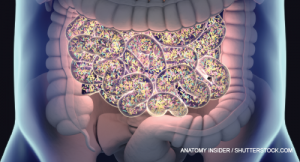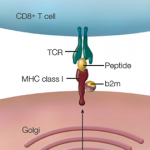 CHICAGO—At the 2019 ACR State-of-the-Art Clinical Symposium, an annual gathering featuring talks by key opinion leaders on the most salient topics for practicing rheumatologists and healthcare providers, Jose U. Scher, MD, director of the Microbiome Center for Rheumatology and Autoimmunity at NYU Langone Medical Center, New York City, was the featured speaker. In his remarks, Dr. Scher discussed fascinating findings from more than a decade’s worth of research examining the relationship between bacteria throughout the body, such as in the lungs and gastrointestinal tract, and inflammatory diseases, such as rheumatoid arthritis.
CHICAGO—At the 2019 ACR State-of-the-Art Clinical Symposium, an annual gathering featuring talks by key opinion leaders on the most salient topics for practicing rheumatologists and healthcare providers, Jose U. Scher, MD, director of the Microbiome Center for Rheumatology and Autoimmunity at NYU Langone Medical Center, New York City, was the featured speaker. In his remarks, Dr. Scher discussed fascinating findings from more than a decade’s worth of research examining the relationship between bacteria throughout the body, such as in the lungs and gastrointestinal tract, and inflammatory diseases, such as rheumatoid arthritis.
Several interesting questions were raised in the talk, among them, “Can certain bacteria trigger an autoimmune response in patients who develop rheumatologic disease?” and “Can one modify the microbiome to prevent or treat autoimmunity?” The potential hypotheses that emerged were tantalizing, and selection of this topic as the theme of the keynote address speaks to the timely importance of understanding the role the microbiome plays in autoimmunity.
Symbiotic Interplay
One area that has attracted particular attention, Dr. Scher noted, is the relationship between spondyloarthritis and the microbiome. Research has shown the microbial cells of the human gut outnumber host cells by a ratio of 10 to 1 and contain 100-fold more genes than the human genome.1 Although clearly a symbiotic interplay exists between this plethora of varied bacteria and their host, with the former benefiting from host nutrients and the latter gaining metabolic and physiologic capabilities provided by these commensal bacteria, the interaction between gut flora and the immune system may yield collateral damage and explain some of the genetic associations seen in spondyloarthritis.
For example, the association between the human leukocyte antigen B27 (HLA-B27) allele and spondyloarthritis has been well established since the 1970s, but only in the 1990s was it shown that HLA-B27 transgenic rats that develop spondyloarthritis are free of colitis and arthritis when the animals are raised in a germ-free environment, and that these gut and joint inflammatory findings re-emerge when normal flora is re-introduced.2,3 Researchers have also shown that the cecal microbiota of HLA-B27 transgenic rats demonstrate differences in bacterial species compared to those of wild-type rats, and 16S microbial sequencing of the microbiomes in terminal ileal biopsies from ankylosing spondylitis patients vs. healthy controls confirmed that similar differences are seen in humans as well.4,5
Dr. Scher noted that James Rosenbaum, MD, professor of ophthalmology at Oregon Health and Science University, and Michael P. Davey, MD, PhD, professor of medicine, Division of Arthritis and Rheumatic Diseases of the School of Medicine at Oregon Health and Sciences University, have put forth a hypothesis: HLA-B27 influences the composition of the body’s endogenous flora and this “B27-shaped flora” causes ankylosing spondylitis.6 Although the pathogenesis of such a sequence remains unclear, CD4+ T cells may play a large role in activation of the interleukin 23 (IL-23)/IL-17 axis in both joint and gastrointestinal inflammation.7
Rat Model Research
In seeking to further understand how HLA-B27 shapes the gut microbiome, Dr. Rosenbaum et al. used rat models to investigate whether HLA-B27-mediated experimental spondyloarthritis is associated with a common gut microbial signature. The study team evaluated HLA-B27 transgenic Lewis and Fischer rats, both of which are known to develop gut inflammation, and Dark Agouti rats, which are resistant to the effects of HLA-B27-associated gut inflammation and spondyloarthritis.
Although the researchers had predicted that comparing gut microbiota in these three different rat strains, which vary in disease severity and penetrance, would show a common microbial signature associated with spondyloarthritis, what they found was HLA-B27-associated changes in the gut microbiome were quite different in the three strains of rats, and HLA-B27-induced microbial dysbiosis appears to be significantly affected by the genetic background of the host.8
The interaction between gut flora & the immune system may yield collateral damage & explain some of the genetic associations seen in spondyloarthritis.
It appears that reality is not as simple as HLA-B27 shaping the microbiome in a specific way to lead to the development of ankylosing spondylitis in a stereotyped pattern. The story is far more complicated.
Environmental Factors
This does not even begin to address the role environmental factors also play in molding the microbiome, Dr. Scher stated. Antibiotic exposure, effects of aging, diet, infections and surgeries that alter the intestinal anatomy are among the many elements that influence the diversity and composition of endogenous bacteria. Although it is not particularly surprising that antimicrobials may dictate changes in the microbiome, recent work has shown the disease-modifying anti-rheumatic drug methotrexate has off-target effects on the human gut microbiota. Methotrexate appears to induce shifts in the relative abundance of bacteria in such a way that the response to treatment and degree of inflammatory disease can be greatly influenced by these changes.9
Such findings raise the question if treatments targeted at inhibition of tumor necrosis factor alpha, IL-17A and IL-23, all of which are effective for the treatment of ankylosing spondylitis, also have off-target effects on the microbiome. If so, then understanding the clinical phenotype of a patient with ankylosing spondylitis may, in the future, prove to be only part of the way in which rheumatologists can subgroup populations of patients. As important may be understanding the unique microbiomes of patients and how these dynamic populations of bacteria affect the development of disease in the first place and, down the line, response or lack of response to treatment.
Microbiome Sequencing
In the modern world of commercially available genetic sequencing, Dr. Scher stated it is not a far-fetched idea that, one day, microbiome sequencing will become available to patients and require interpretation by a host of healthcare providers, including those in the field of rheumatology. With the burgeoning understanding of the role microbiota may play in the pathogenesis of ankylosing spondylitis, it will be incumbent upon rheumatologists to learn more about this topic to help guide patients.
As many practicing rheumatologists know already, patients are eager to understand the role diet and the environment may play in inflammatory pathways and the development of autoimmune disease, and the microbiome is a part of this larger picture. Even though it may be many years from now before physicians can give specific recommendations on how to change diet, avoid antimicrobials, repopulate gut flora with probiotics and other interventions, and ultimately select personalized therapy for patients with ankylosing spondylitis and other conditions in the category of spondyloarthritis, it is more than a gut feeling that this area of research will continue to grow more and more important in the years to come.
 Jason Liebowitz, MD, completed his fellowship in rheumatology at Johns Hopkins University, Baltimore, where he also earned his MD. He is currently in practice with Arthritis, Rheumatic, & Back Disease Associates, New Jersey.
Jason Liebowitz, MD, completed his fellowship in rheumatology at Johns Hopkins University, Baltimore, where he also earned his MD. He is currently in practice with Arthritis, Rheumatic, & Back Disease Associates, New Jersey.
References
- Bäckhed F, Ley RE, Sonnenburg JL, et al. Host-bacterial mutualism in the human intestine. 2005 Mar 25;307(5717):1915–19
- Taurog JD, Richardson JA, Croft JT, et al. The germfree state prevents development of gut and joint inflammatory disease in HLA-B27 transgenic rats. J Exp Med. 1994 Dec 1;180(6):2359–23
- Rath HC, Herfarth HH, Ikeda JS, et al. Normal luminal bacteria, especially Bacteroides species, mediate chronic colitis, gastritis, and arthritis in HLA-B27/human beta2 microglobulin transgenic rats. J Clin Invest. 1996 Aug 15;98(4):945–953.
- Lin P, Bach M, Asquith M, et al. HLA-B27 and human β2-microglobulin affect the gut microbiota of transgenic rats. PLoS One. 2014 Aug 20;9(8):e105684.
- Costello ME, Ciccia F, Willner D, et al. Brief report: Intestinal dysbiosis in ankylosing spondylitis. Arthritis Rheumatol. 2015 Mar; 67(3):686–
- Rosenbaum JT, Davey MP. Time for a gut check: Evidence for the hypothesis that HLA-B27 predisposes to ankylosing spondylitis by altering the microbiome. Arthritis Rheum. 2011 Nov;63(11):3195–319
- Taurog JD, Maika SD, Satumtira N, et al. Inflammatory disease in HLA-B27 transgenic rats. Immunol Rev. 1999 Jun;169:209–2
- Gill T, Asquith M, Brooks SR, et al. Effects of HLA-B27 on gut microbiota in experimental spondyloarthritis implicate an ecological model of dysbiosis. Arthritis Rheumatol. 2018 Apr;70(4):555–565.
- Nayak RR, Alexander M, Stapleton-Grey K, et al. Perturbation of the human gut microbiome by a non-antibiotic drug contributes to the resolution of autoimmune disease. bioRxiv ePub 2019 Apr 5.



